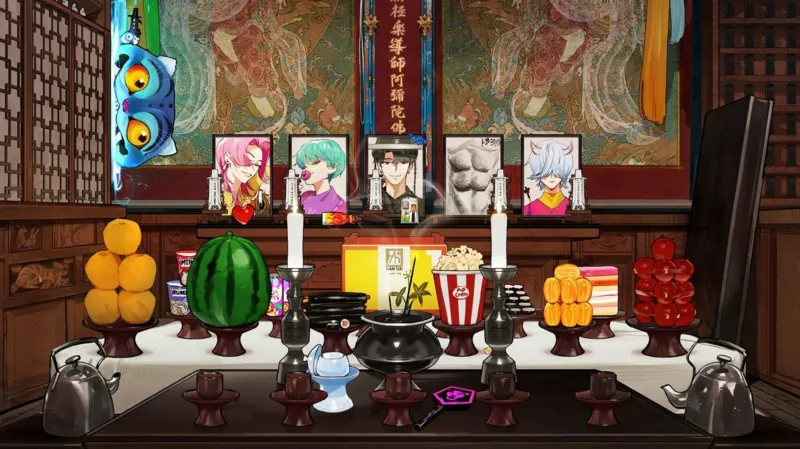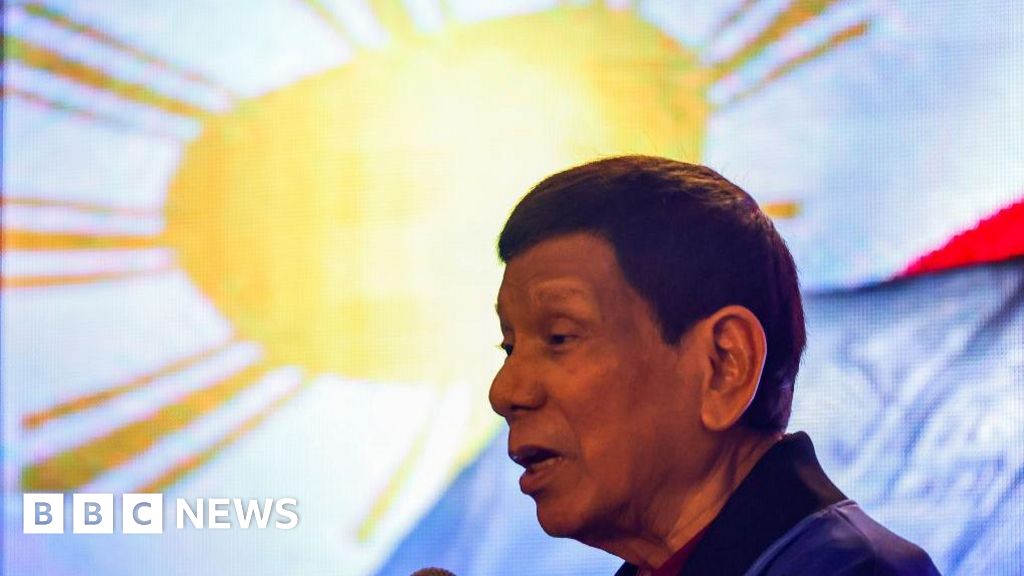Yuna KuBBC Korean, Seoul
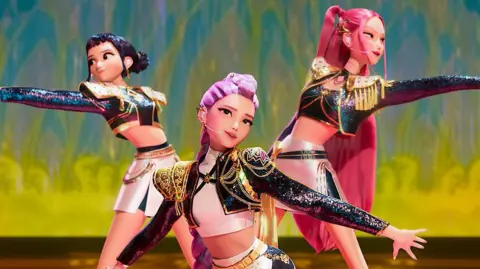 Netflix
NetflixWhen a South Korean monk performed a Buddhist ritual for a wildly popular K-pop boy band, it was the most unusual ceremony he had ever held.
His mission: to guide the souls of the band to peace and rebirth.
The band were long gone – or rather, they had never been alive, except in the fictional world of the animated Netflix hit Kpop Demon Hunters.
Still, the YouTube video went viral.
Although cast as villains, the Saja Boys have won a devoted following for their gorgeous looks and swagger. Even their name – saja – translates to “angel of death”, among other things.
The live-streamed service, a genuine Buddhist rite known as Chondojae usually performed by monks for grieving families, lasted more than two hours and drew more than 4,000 viewers – more people than he had ever seen for a ceremony, even offline, says the monk, a virtual YouTuber who prefers to remain anonymous.
This was no joke. The BBC confirmed that he is a registered monk. But he could not guarantee salvation for the Saja Boys, not even for the lead, Jinu.
“That would depend on his good karma. I can guide him, but I can’t promise.”
As K-pop Demon Hunters tops every chart – Netflix says it has become its most watched movie ever – Koreans are revelling in the moment. Made and voiced by Korean-Americans, developed by Sony and released by Netflix, the film’s inspiration is deeply Korean.
It’s a tale about mythical demon hunters whose power comes from their music – in this case, that’s a sassy K-pop girl band called Huntrix. And of course, the soundtrack that fans across the world are now singing along to every day is rooted in South Korea’s biggest export: K-pop.
All of this has sparked a frenzy in South Korea, like in so many other places, a fascination with the Korean culture the movie centres, and even a little bit of FOMO – because unlike in the US and Canada, there are no plans yet to release the movie in cinemas here.
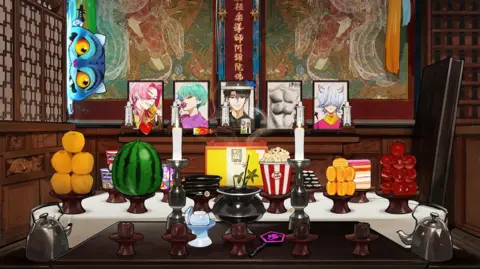 @illegalmonk_v
@illegalmonk_v“Seeing all the sing-along clips [online] at cinemas… I’m jealous of Americans!” wrote a fan on social media. Another vowed, “I’ll even take a day off if KDH comes to cinemas” – a big promise in South Korea’s gruelling work culture.
Part of the fandom is driven by respect. Many Koreans are wary of clumsy depictions of their country on screen, especially given how popular the culture is right now. And to have such a global hit get it wrong would have stung.
“I’ve seen plenty of films and dramas that touched on Korean culture, but they were always full of errors. They would confuse it with Chinese or Japanese traditions, show actors speaking awkward Korean, and reduce everything to a shallow imitation,” says Lee Yu-min, a woman in her 30s.
“But I was genuinely astonished at KDH’s portrayal of our culture.” Pointing to the opening scene, she says: “A thatched-roof house from the Joseon Dynasty, ordinary people in hanbok [traditional Korean clothing] with their distinct hairstyles – the details were almost perfect.”
She says she had “never imagined” that it would capture hearts across the world the way it has.
Songs from the movie have become some of the most streamed on Spotify, while the track Golden hit number one on the Billboard Hot 100.
The fandom in South Korea is no less. Surprisingly, one of the biggest beneficiaries has been the National Museum of Korea, which carries traditional Korean artefacts that are featured in the film.
Already the most visited museum in Asia, it now has queues stretching outside before the doors even open, as Koreans line up to look at exhibits and shop for merchandise at the gift store. It recorded more than 740,000 visitors in July, over twice as many as it had during the same time last year.
“I arrived there at 10am sharp, that’s when the museum opens, but there were already about a hundred people waiting,” says Lee Da-geon who hoped to avoid the weekend rush by going on a Monday.
But she still left empty-handed: “Everything I wanted sold out.” Her wishlist included a badge featuring a tiger and a magpie – the movie’s animal characters Derpy and Sussie, which are inspired by folk painting.
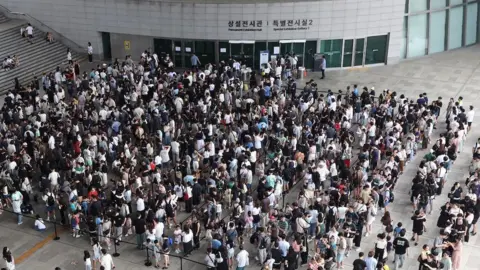 News1
News1The soaring sales are a boost for people like Choi Nyun-hee, who runs the craft business Heemuse. “My revenue has jumped about five-fold,” she says, adding that her products are now being exported to the US and Australia.
She says she discovered Kpop Demon Hunters when the tiger-shaped “norigae”, a traditional pendant, with mother-of-pearl, “suddenly started selling out”.
Choi had previously worked at a museum, where she developed educational programs on Korean artefacts. After watching the film, she thought “Korean culture was well-displayed and weaved together into a story”.
For others, it’s not just the imagery and symbolism that resonated. “Rumi, the heroine, hides her true self out of embarrassment and shame. I related to that,” says Lee Da-geon. “In Korea, people worry far too much about what others think.”
Park Jin-soo, a YouTuber who has worked in the Korean film industry, admits he initially dismissed the movie as “a bizarre animation based on K-pop,” but when he finally watched it, he found that he thoroughly enjoyed it.
“I would personally like to see KDH on screen, especially at a time when South Korean cinema is desperately in need of blockbuster movies,” he says.
“Right now, they are at war over sharing the same pie, but streaming and cinemas each have their own purpose. If they shape trends together and if it goes viral, won’t the pie they’re fighting over ultimately grow larger? I think KDH can play that role.”
To him, the “sing-along” experience – which is something that only a cinema can offer – is one way of turning a streaming hit into a box office blockbuster.
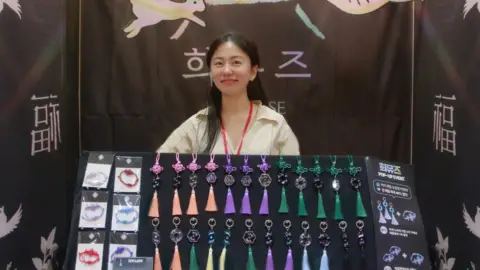 Choi Nyun-hee
Choi Nyun-heeMore than two months after its release, the film’s momentum hasn’t slowed – in fact, it’s spilling into cinemas. In North America, special “sing-along” screenings have made K-pop Demon Hunters Netflix’s first number one film at the box office.
Now South Korean fans are clamouring for the same experience, with so many of them saying online and offline, “I want to sing KDH in a cinema!!”
The movie will show at the Busan International Film Festival in September, which has announced limited sing-along screenings this year, though tickets are expected to be scarce.
Lee Yu-min, who has watched the film more than five times on Netflix, says she’s determined to go if it arrives in the cinema: “I’ll definitely drag my husband along – he hasn’t seen it yet.”
“I’m rooting for KDH screening in South Korea,” declares a fan online. “I know nothing has been confirmed, but I’m already starting to memorise all the lyrics.”
Another asks: “K-pop Demon Hunters is screening in North America, Canada and the UK… so why not in the home of K-pop?”
